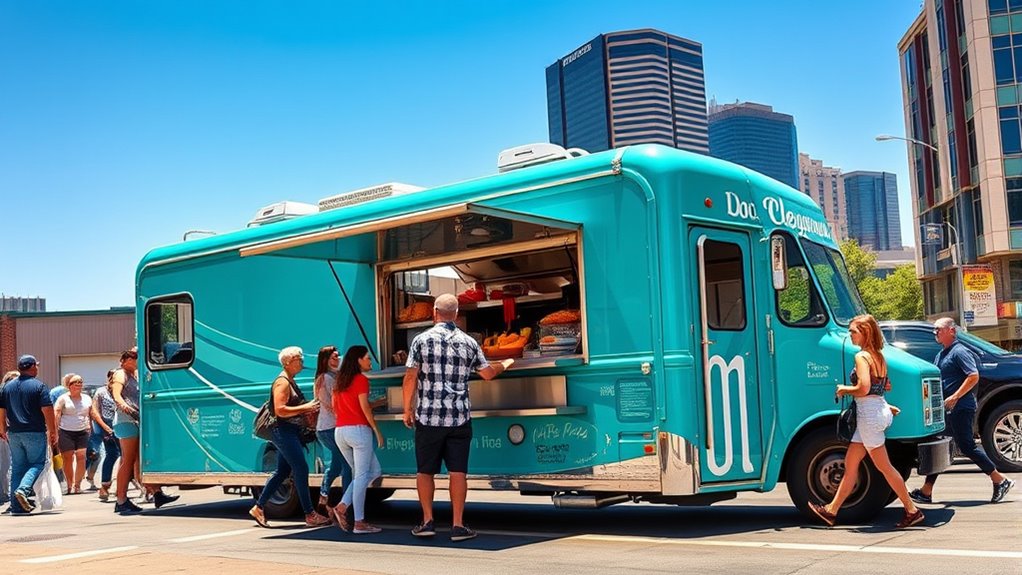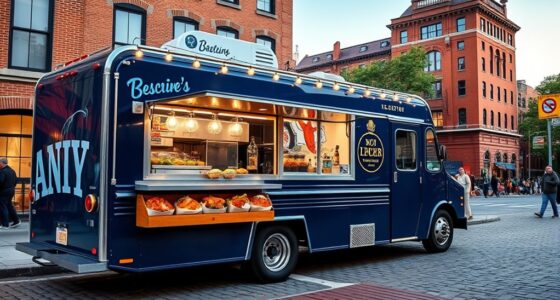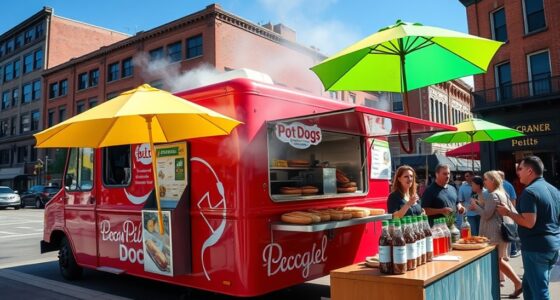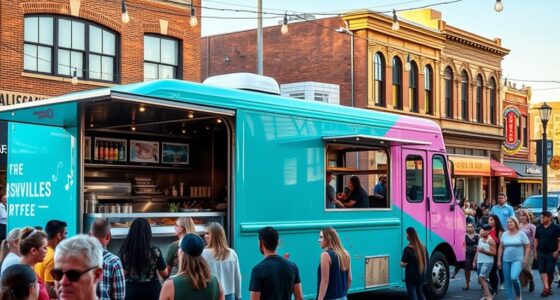To start a food truck in Kansas City, MO, you’ll need to understand local permit and health inspection requirements, choose a strategic location, and design a unique concept that stands out. Budget for equipment, permits, and licenses, then develop a favorite menu with competitive pricing. Embrace marketing through social media, community events, and branding to attract loyal customers. Keep exploring the details to guarantee your food truck venture becomes a Kansas City success.
Key Takeaways
- Obtain necessary local permits, licenses, and health inspections, ensuring compliance with Kansas City regulations and designated vending zones.
- Develop a unique branding concept and marketing strategy, including social media presence and local event participation.
- Design a menu tailored to Kansas City’s tastes, focusing on local barbecue specialties and profitable pricing strategies.
- Secure funding for equipment and initial costs through budgeting, grants, and small business support programs.
- Choose an appropriate location and setup plan, including shared kitchens and sanitation practices, to ensure smooth operations.
Starting With a Unique Concept
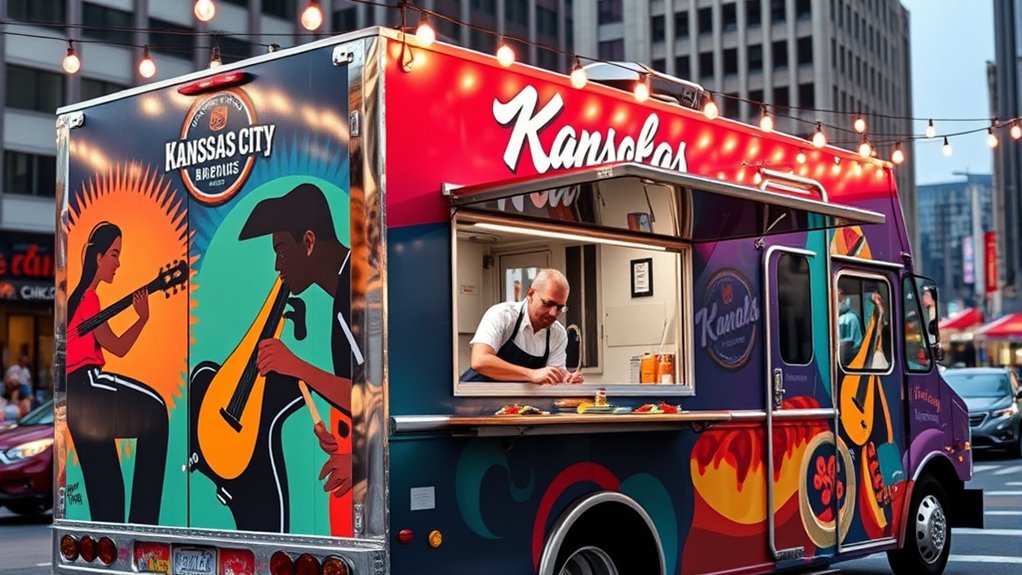
To stand out in Kansas City’s bustling food truck scene, you need a unique concept that captures people’s attention. Your food truck branding is the first thing customers see, so make it memorable and reflective of your style. Consider how your design, logo, and overall vibe communicate your story. Next, focus on menu innovation—offer something different that excites taste buds and keeps people coming back. Think outside traditional options; experiment with fusion dishes or seasonal ingredients. A distinctive concept helps you carve your niche and build a loyal following. Remember, success starts with a clear identity and a creative menu that sets you apart from the competition. Incorporating creative designs into your branding can elevate your indoor and outdoor aesthetic, making your food truck more attractive and memorable. With these elements, you’ll attract curious customers ready to try something new.
Understanding Local Requirements

To operate your food truck in Kansas City, you need to understand the local permits and health inspection procedures. Make sure to check out the designated street vending zones to find the best locations. Staying compliant with these requirements helps your business run smoothly and legally. Additionally, considering Halloween product reviews can be beneficial if you plan to participate in seasonal events or promotions.
Kansas City Food Truck Permits
Getting your food truck licensed in Kansas City requires understanding the local permit process, which guarantees your business complies with health and safety standards. You’ll need to submit a detailed food truck design that meets city regulations, ensuring your vehicle is safe and properly equipped. The permit process also involves showcasing menu innovation, demonstrating your offerings align with local food permits and zoning laws. Kansas City requires specific documentation, including proof of food handler training and a valid business license. Be prepared to pay applicable fees and schedule inspections. Staying compliant means staying informed about any updates to local requirements. By understanding these permit essentials, you’ll streamline your approval process and confidently launch your food truck in Kansas City.
Kansas City Health Inspection Procedures
Understanding Kansas City health inspection procedures is essential for ensuring your food truck meets all safety standards. You’ll need to maintain proper sanitation, food handling, and equipment upkeep. The inspection process covers areas like food storage, temperature controls, and cleanliness. To stay compliant, regularly review the requirements below:
| Inspection Area | Key Focus | Tips |
|---|---|---|
| Food Storage | Proper labeling and separation | Use sealed containers |
| Temperature Control | Correct fridge and cooking temps | Regularly monitor with gauges |
| Equipment Maintenance | Cleanliness and calibration | Schedule routine checks |
| Employee Hygiene | Handwashing and gloves | Train staff properly |
| Food Truck Branding | Clear signage, safe practices | Use social media marketing to promote compliance |
Staying on top of health standards not only ensures safety but also helps build your brand reputation.
Designated Street Vending Zones
Knowing where you can set up your food truck is just as important as passing health inspections. Kansas City has designated street vending zones that you must operate within, per local street vendor regulations. These zones are established to manage traffic, ensure safety, and protect local businesses. Vending zone enforcement is strict, so it’s essential to verify your location before setting up. Failing to adhere to these regulations can result in fines or your truck being shut down. To avoid issues, check with the Kansas City Street Vending Program or city permits office for a list of approved zones. Understanding these designated areas helps you stay compliant and focus on serving your customers without worry.
Setting Up Your Base of Operations
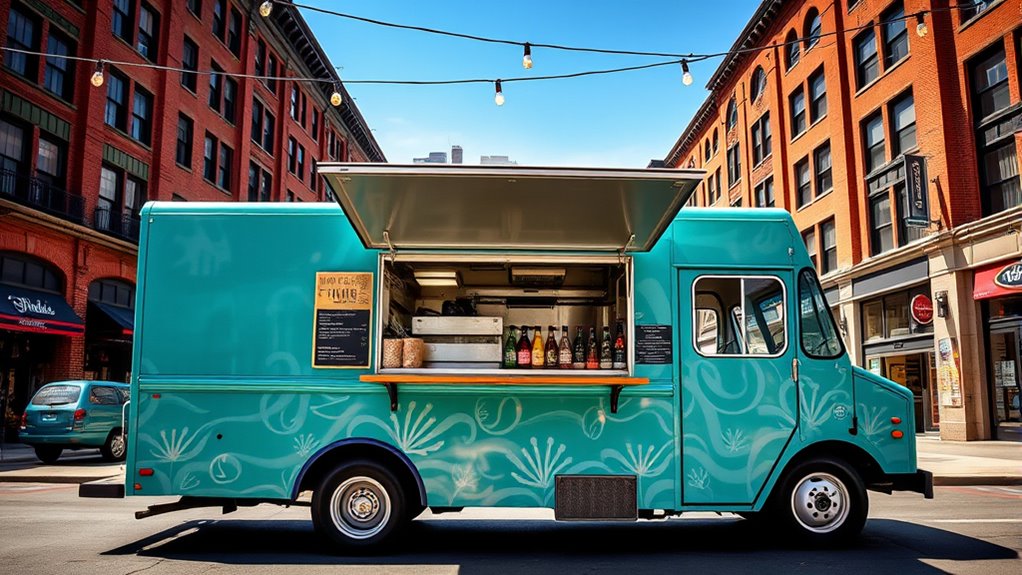
Choosing the right base of operations is essential for your food truck’s success. You’ll want to explore shared kitchen licensing options and plan a custom kitchen layout that fits your menu and workflow. These decisions lay the foundation for efficient operations and legal compliance in Kansas City. Additionally, understanding local size restrictions and zoning laws can help you select an appropriate location that complies with regulations and optimizes your business potential.
Shared Kitchen Licensing Options
Setting up your food truck often starts with selecting the right shared kitchen license, which allows you to operate legally without investing in a dedicated commercial space. Shared kitchen licensing provides a flexible, cost-effective way to meet health and safety standards while using existing commercial kitchens. These facilities typically have the necessary commercial kitchen permits in place, saving you time and effort. When choosing a shared kitchen, verify that it complies with local health department regulations and offers the equipment you need. This option helps you focus on developing your menu and brand without the overhead of a permanent location. By securing the appropriate shared kitchen licensing, you guarantee your food truck business is fully compliant and ready to serve customers in Kansas City.
Custom Kitchen Layout Planning
Designing a custom kitchen layout is a crucial step in establishing an efficient and functional base of operations for your food truck. Proper planning ensures smooth workflow and maintains kitchen safety. Focus on these key aspects:
- Work Zones: Separate prep, cooking, and cleaning areas to minimize cross-contamination and improve efficiency.
- Equipment Placement: Position appliances for easy access and maintenance, reducing downtime and ensuring safety.
- Ventilation & Safety: Install proper ventilation systems and keep fire extinguishers accessible, supporting kitchen safety standards.
A well-thought-out layout simplifies equipment maintenance, keeps operations smooth, and prioritizes safety. Tailoring your kitchen to these principles helps you serve delicious food while minimizing hazards and downtime.
Budgeting and Financing Your Food Truck

When planning your food truck, you need to consider the costs of initial equipment purchases and how you’ll cover those expenses. Local small business grants can provide valuable funding, so it’s worth exploring your options. Don’t forget to budget for liability coverage to protect your business and stay compliant with local regulations. Additionally, researching best small business grants can increase your chances of securing financial assistance.
Initial Equipment Purchase Costs
Budgeting for your food truck’s initial equipment is a crucial step that requires careful planning. You need to take into account both upfront costs and ongoing expenses, especially for equipment maintenance. Here are three key items to budget for:
- Cooking Equipment – Commercial-grade stoves, grills, and fryers are essential for food prep and can cost between $10,000 and $20,000.
- Food Truck Branding – Investing in eye-catching wraps and signage boosts visibility and attracts customers, typically costing around $3,000 to $6,000.
- Storage and Refrigeration – Proper storage units ensure food safety and freshness, with prices ranging from $2,000 to $8,000.
Remember to factor in these costs to stay within your budget and guarantee your equipment remains in top condition, supporting your brand’s reputation.
Local Small Business Grants
Securing funding for your food truck can be more manageable than you think, especially with the help of local small business grants. These grants are designed to support entrepreneurs like you and can substantially reduce your startup costs. Research opportunities available through Kansas City’s economic development programs or local business associations. Applying for grants requires careful preparation, including a solid business plan and financial projections. Local small business grants can supplement food truck financing options such as loans or personal savings, giving you more flexibility. Keep in mind that grants don’t need repayment, making them an attractive funding source. By exploring these options, you can build a strong financial foundation for your food truck venture and move closer to turning your culinary dreams into reality.
Liability Coverage for Food Trucks
Liability coverage is a crucial aspect of budgeting and financing your food truck, as it protects your business from costly legal claims and damages. Meeting insurance requirements ensures you have adequate liability protection, which is essential for compliance and peace of mind. To maximize your coverage, consider these key points:
- Understand the minimum insurance requirements mandated by local laws and your lender.
- Invest in comprehensive liability protection that covers property damage, bodily injury, and legal fees.
- Regularly review and update your policy to reflect changes in your business operations or risks.
Designing Your Menu and Pricing Strategy

To succeed, you need a menu tailored to Kansas City’s tastes and preferences. Calculating your cost per serving helps set prices that attract customers while covering expenses. By customizing dishes and pricing strategically, you’ll build a menu that stands out and stays profitable.
Customizing Dishes for Kansas City
When designing your menu and pricing strategy for a Kansas City food truck, it’s essential to tailor your offerings to local tastes and competitive dynamics. Kansas City barbecue is a must-include, so consider adding signature ribs or burnt ends that showcase authentic flavors. Incorporate local culture by pairing dishes with jazz music-inspired names or themes, creating a vibe that resonates. To stand out, focus on:
- Offering a variety of barbecue options with different spice levels and sides.
- Pricing strategically by considering local spending habits and competitor rates.
- Including unique, Kansas City-specific items like smoked brisket sliders or barbecue nachos.
Cost per Serving Calculations
Calculating the cost per serving is a vital step in shaping your menu and setting prices that guarantee profitability. When you know your food costs, you can make informed decisions about menu customization that appeals to your target audience. This calculation helps ensure you cover expenses like ingredients, labor, and overhead while maintaining competitive pricing. Incorporate your food truck branding into your pricing strategy to create a consistent, appealing image. By understanding the true cost of each dish, you can adjust portion sizes or ingredient choices to optimize profit margins. Accurate cost per serving calculations also help you identify which menu items are most profitable, guiding your menu design and pricing strategy for long-term success in Kansas City’s vibrant food scene.
Technology and Operations

You’ll find that adopting contactless payment options makes transactions faster and safer for your customers. Using a mobile POS system helps you manage sales and inventory on the go, keeping operations smooth. With stock tracking tools, you can stay ahead of supply needs and reduce waste, ensuring your food truck runs efficiently. Implementing technology in lifestyle can further optimize your daily operations and improve customer experience.
Contactless Payment Options Available
Have you noticed how many food trucks now accept contactless payments? It’s a convenient way to speed up transactions and enhance customer experience. Here are three key benefits:
- Faster Payments: Contactless payments and digital wallets let you serve more customers quickly, reducing wait times.
- Enhanced Security: They use encrypted data, making transactions safer for both you and your customers.
- Modern Appeal: Accepting contactless payments shows you’re tech-savvy and keeps up with current trends.
Mobile POS and Stock Tracking
Integrating mobile POS systems and stock tracking tools streamlines your food truck’s operations, making order management and inventory control more efficient. A mobile POS allows you to process sales quickly, accept various payment methods, and track sales data in real-time. This helps you stay on top of customer preferences and peak times. Stock tracking tools enable you to monitor inventory levels automatically, reducing waste and preventing shortages. With these technologies, you can easily update menu items, manage supplies, and analyze sales trends on the go. Combining mobile POS and stock tracking enhances your operational efficiency, saves time, and improves customer service. Investing in these systems helps you run your Kansas City food truck smoothly, allowing you to focus more on the food and less on administrative tasks.
Marketing and Growing Your Presence

To grow your food truck’s presence in Kansas City, focus on popular local event venues where crowds gather. Engaging with Kansas City foodies through social media and word-of-mouth can also boost your visibility. By targeting these key spots and communities, you’ll attract loyal customers and expand your reach effectively.
Popular Local Event Venues
Looking for ways to boost your food truck’s visibility in Kansas City? Focusing on popular local event venues can substantially increase your exposure. These venues attract large crowds enthusiastic to try new foods and appreciate eye-catching food truck aesthetics. To maximize your presence, consider these strategies:
- Partner with farmers markets, festivals, and outdoor concerts that highlight local food trends, drawing in food lovers.
- Customize your truck’s appearance to reflect Kansas City’s culture and your signature menu, making your truck memorable.
- Schedule appearances at high-traffic events, ensuring your truck becomes a go-to spot for locals and visitors alike.
Engaging with these venues helps you build a loyal customer base and keeps your food truck top-of-mind in Kansas City’s vibrant food scene.
Engaging Kansas City Foodies
Connecting with Kansas City foodies is a powerful way to grow your food truck’s presence. Focus on strong food truck branding that reflects your unique style and menu, making it memorable. Use social media marketing to engage directly with your audience—post daily updates, share behind-the-scenes content, and highlight special events. Encourage satisfied customers to tag your truck and leave reviews, boosting your visibility. Attend local food festivals and community gatherings to create authentic connections. Respond promptly to comments and messages, showing you value their support. Collaborate with local influencers to expand your reach. Consistent, genuine engagement helps build loyalty, turning casual passersby into loyal fans. When Kansas City foodies feel connected to your brand, your food truck’s popularity will naturally grow.
Kansas City Food Scene Success

Kansas City’s food scene has experienced a remarkable surge in popularity, driven by innovative chefs and diverse culinary offerings. This success opens opportunities for new food trucks to stand out. To do so, focus on:
Kansas City’s booming food scene offers new food trucks a chance to shine through standout branding and local event partnerships.
- Food truck branding – create a memorable logo and design that captures your unique flavor and attracts attention.
- Social media marketing – regularly post vibrant photos and updates to engage local customers and build a loyal following.
- Partnerships with local events – participate in festivals and farmers markets to boost visibility and connect with food enthusiasts.
Frequently Asked Questions
What Permits Are Required Specifically for Food Trucks in Kansas City?
In Kansas City, you need specific permits for mobile vending and licensing requirements to operate a food truck legally. You must obtain a Mobile Food Vendor Permit from the Kansas City Health Department and a Business License from the city. Additionally, you’ll need a Food Service License, a Vehicle License, and possibly a Commissary License. Make sure to pass health inspections and comply with local regulations to keep your food truck running smoothly.
How Do Kansas City Health Regulations Differ for Food Trucks Versus Brick-And-Mortar Restaurants?
You’ll find that Kansas City’s health regulations for food trucks emphasize food safety inspections and health code compliance just like brick-and-mortar restaurants. However, trucks often face additional challenges, like mobile setup requirements and temporary permits. While both must meet rigorous standards, trucks need to adapt their procedures for on-the-go operations, ensuring cleanliness and safety at all times. Staying vigilant with inspections keeps your mobile business running smoothly and compliant.
Are There Any Local Food Truck Associations or Networks in Kansas City?
Yes, you can join local food truck communities and networks in Kansas City to connect with fellow vendors. These groups often host networking events, which are great for sharing tips, gaining support, and finding new opportunities. Participating in these communities helps you stay informed about local regulations, best practices, and upcoming events, making your food truck journey smoother and more successful.
What Are the Best Locations or Events to Park a Food Truck in Kansas City?
You’ll find that parking your food truck at popular festival locations or high-traffic parks is the best way to attract customers in Kansas City. Did you know that Kansas City hosts over 100 festivals annually? Consider spots like Loose Park or the River Market, where foot traffic is consistently high. These busy areas boost your visibility, helping your food truck thrive and making every day a potential busy day.
How Does Kansas City’s Weather Impact Food Truck Operations Year-Round?
Kansas City’s weather impacts your food truck operations year-round through seasonal temperature fluctuations and annual precipitation patterns. During hot summers, you need to stay hydrated and keep equipment cool, while winter cold can freeze pipes and slow sales. Frequent rain and snow require waterproof covers and flexible scheduling. By anticipating these weather changes, you can adapt your plan, ensuring consistent service despite Kansas City’s diverse climate.
Conclusion
Starting your food truck journey in Kansas City means stepping into a city bursting with flavor and endless opportunities. With a solid plan, a unique concept, and a dash of passion, you’ll turn your dream into reality—like a masterpiece unfolding on wheels. Remember, every great success begins with a single step; your food truck could soon be the heartbeat of Kansas City’s vibrant culinary scene. Are you ready to make your mark?
